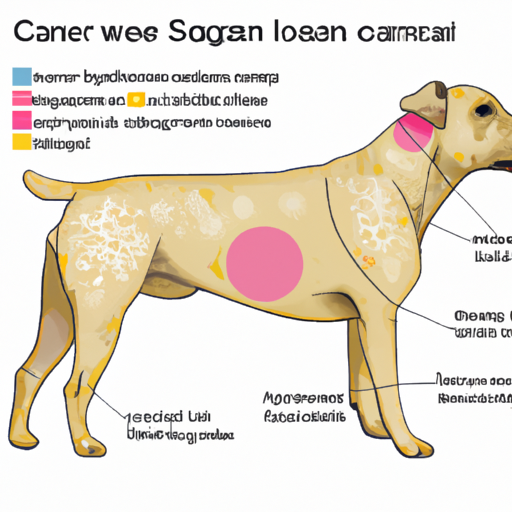Understanding Canine Cancer
Cancer is a dog’s worst enemy, just as it is for humans. But what does cancer look like in dogs? You, as a caregiver, need to understand that canine cancer manifests in various ways. The symptoms and signs may be different, dictated by the type of cancer, the dog’s breed, and their individual health history.
Recognizing the Symptoms
Noticing the symptoms early can increase the chances of successful treatment. Here are some signs to watch out for:
- Abnormal Swellings – Tumors may not always be cancerous, but an unusual lump or bump should be checked by a vet.
- Sores That Do Not Heal – If your dog has wounds or sores that aren’t healing despite treatment, it could be a sign.
- Weight Loss – Sudden, unexplained weight loss is often a red flag.
- Loss of Appetite – A lack of interest in food and water is another symptom.
- Difficulty Breathing, Urinating, or Defecating – If your dog seems to struggle with these basic functions, it’s time to consult a vet.
Types of Canine Cancer
Cancer comes in many forms in dogs. Here are the most common types:
- Lymphoma – This cancer affects the lymph nodes and can cause swelling in the neck, armpit, or groin.
- Mast Cell Tumors – These are most commonly found on the skin but can also affect other parts of the body.
- Melanoma – This is a type of skin cancer, often seen in dogs with dark skin or fur.
- Osteosarcoma – This is a bone cancer that usually affects large breeds.
| Type of Cancer | Common Symptoms |
|---|---|
| Lymphoma | Swelling, fever, weight loss |
| Mast Cell Tumors | Lumps, itching, redness |
| Melanoma | Dark patches, hair loss, ulcers |
| Osteosarcoma | Lameness, swelling, pain |
Treatment Options for Canine Cancer
Just like in humans, canine cancer can be treated with a variety of methods. The best treatment plan will depend on the type of cancer, its stage, and the overall health of your dog. Options can include surgery, radiation therapy, chemotherapy, and immunotherapy.
FAQs About Cancer in Dogs
Q: Are some breeds more prone to cancer than others?
A: Yes, certain breeds like Golden Retrievers, Boxers, and Rottweilers have a higher risk of developing certain types of cancer.
Q: Can dogs get cancer at any age?
A: While cancer is more common in older dogs, it can occur at any age.
Q: Is cancer in dogs always fatal?
A: No, many forms of cancer in dogs can be treated effectively, especially if caught early.
Q: Can I prevent my dog from getting cancer?
A: While there’s no surefire way to prevent cancer, maintaining a healthy diet and regular exercise can lower the risk.
Remember, nothing replaces professional advice. If you suspect your dog has cancer, it’s crucial to seek veterinary care immediately. Early detection and treatment can make all the difference.



